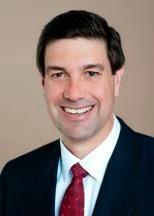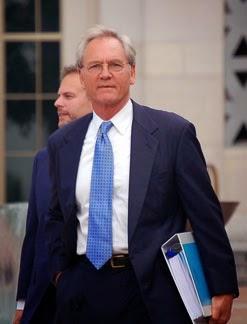
Rob Riley
A federal prosecutor communicated with prominent Alabama Republican Rob Riley during the investigation of former Democratic Governor Don Siegelman, according to a report released yesterday.Riley was serving as campaign manager for his father, Bob Riley, who was Siegelman's chief political opponent at the time. The revelation seems to support claims that Siegelman supporters have been making for years--that unlawful political motivations played a pivotal role in the prosecution.
Adam Zagorin wrote the article, titled "Justice Department Downplays Evidence of Politics in Probe of Governor," for Project On Government Oversight (POGO). The information about Rob Riley is included in a letter, dated June 3, 2010, from Assistant Attorney General Ronald Weich to U.S. Representative John Conyers (D-Mich.), who was then chair of the House Committee on the Judiciary. (See full letter at the end of this post.)
A Justice Department internal affairs unit, the Office of Professional Responsibility (OPR), was critical of several government attorneys involved in the Siegelman case, but concluded that the evidence "did not establish that political motivation played a role" in the case.
Why would a prosecutor contact the campaign manager for Siegelman's primary political opponent--if, in fact, politics were not involved? Why would Rob Riley's correspondent refer to himself as a "conservative prosecutor"?
Here is Zagorin on the communications between a member of the prosecution team and Rob Riley:
In 2002, during the Justice Department’s investigation of Siegelman’s administration, a federal prosecutor emailed the son and campaign manager of Siegelman’s principal Republican opponent updating him on the confidential probe, according to a Justice Department document obtained by the Project On Government Oversight and reported here for the first time.
In the email, the prosecutor said he had been “thwarted” after starting an investigation “into the Siegelman administration.” He added that it was “frustrating for me and a small group of like minded conservative prosecutors” to “fight the tide in order to do the job we are sworn to do.”
Many questions remain unanswered, Zagorin reports, in part because the Department of Justice (DOJ) apparently tried to hide information from Conyers and others. Many of those unanswered questions involve Rob Riley. Writes Zagorin:
In listing the people OPR interviewed, the Justice Department letter summarizing the probe does not name Rob Riley, the son of and campaign manager for Siegelman’s political rival Bob Riley and the recipient of the “like minded conservatives” email. As a result, it is unclear whether OPR contacted him.
The DOJ letter also offers no indication of why the prosecutor emailed Riley in the first place, and on whose instructions, if anyone’s. Nor does it say whether Riley replied or took any subsequent action. It does not explain how the “small group of like minded conservative prosecutors” fit into the picture, or why the prosecutor injected his own political leanings and those of his colleagues into the matter.
The unanswered questions also include who may have “thwarted” the conservative prosecutors and why, and what penalty the prosecutor faced, if any, for sending the email.
“I do not recall receiving the email in 2002, but I had nothing to do with the U.S. Attorney’s Office pursuing charges against Don Siegelman,” Rob Riley told POGO, noting that the contact would have occurred more than a decade ago. “I also do not recall being contacted by OPR one way or the other.”
The Conyers letter criticizes former Alabama U.S. attorneys Leura Canary and Alice Martin, who both oversaw prosecutions against Siegelman. The DOJ concluded, however, that no substantive discipline was merited:
The letter summarizing OPR’s investigation into prosecutors’ handling of the Siegelman matter shows that the internal watchdog singled out four prosecutors for at least some criticism, but nonetheless concluded that “political motivation” played no role in the case.
One of those singled out was Leura G. Canary, an experienced DOJ career lawyer who served as U.S. Attorney for Alabama’s Middle District, where Siegelman was tried and convicted.
A few months before Bob Riley defeated the incumbent Siegelman in the 2002 election, Canary formally recused herself from the Siegelman investigation. She did so following accusations, widely disseminated by the Siegelman camp, that she had a variety of political conflicts of interest. For example, citing public records, a lawyer for Siegelman protested that one of Siegelman’s political opponents had paid fees to Canary’s husband, a prominent Republican consultant.
In a letter explaining Canary’s recusal, Deputy Assistant Attorney General David Margolis wrote that DOJ had found no conflict, but that out of “an abundance of caution,” Canary would withdraw from the case anyway. She issued a similar statement.

Don Siegelman
DOJ’s letter to Conyers also highlights the recusal issue. It cites an example where Siegelman was sending out campaign literature claiming that his prosecution was political, a copy of which apparently reached Canary. Despite her recusal, she then forwarded the campaign literature to Siegelman’s prosecutors, suggesting it could provide “a basis for a gag order” to prevent the ex-governor or his lawyers from raising allegations of undue political influence at trial. The letter says Canary should not have done this.
Soon after she contacted the prosecution team, it did in fact seek such a gag order, though a judge refused to grant one.
OPR minimized this example of Canary’s continued involvement in the case. It found that “Canary did not commit professional misconduct or exercise poor judgment in connection with her recusal from the Siegelman case.”
As for Martin, OPR found she exercised poor judgment in a minor administrative matter:
At another point, the DOJ letter refers to a separate attempt in 2004 by the Northern District of Alabama to prosecute Siegelman for corruption. A federal judge with nearly 30 years tenure threw that matter out of court, later calling it “completely without legal merit” and “the most unfounded criminal case over which I presided in my entire judicial career.” Citing the 2004 case, the judge wrote a letter to Attorney General Eric Holder calling for an investigation of prosecutorial misconduct in Siegelman’s subsequent 2006 conviction.
OPR had a different view. It concluded that, while the evidence in the 2004 case was “weak, the decision to prosecute. . .did not violate the Principles of Federal Prosecution.”
According to the DOJ letter, OPR had a procedural complaint. It found that the U.S. Attorney who brought the case, Alice Martin, “exercised poor judgment by failing to comply with Department guidelines” requiring her to “provide timely notice” of Siegelman’s indictment to DOJ headquarters.
Reached by POGO, Martin said, “We exercised great judgment in bringing the case, after a grand jury indicted Siegelman.”
Were politics at work in the Siegelman case? POGO shows that the DOJ considered Lanny Young to be an unreliable witness regardomg incriminating evidence against Republicans Jeff Sessions and Bill Pryor. But the department used Young extensively in the case against Siegelman. Writes Zagorin:
The letter also says that “evidence did not support” an allegation that appeared in TIME magazine in 2007. That story, written by the author of this article, cited FBI documents showing the prosecution relied on a witness who gave incriminating evidence against Siegelman and two prominent Republican politicians in Alabama. Investigators and prosecutors allegedly ignored the evidence against the two Republicans.
The letter says OPR concluded that investigators and prosecutors did not pursue those matters because of “concerns” about the witness’s “credibility” as well as a “lack of resources.” The letter also reports that a lawyer in DOJ’s Public Integrity Section later re-interviewed the witness and determined that his allegations “lacked merit” and were probably “time barred” from prosecution. The letter says nothing about why, given those weaknesses, prosecutors chose to have the witness testify for four days at Siegelman’s trial, where the witness’s allegation figured in about half of the 32 corruption counts brought against the ex-governor. . . .
As long as the Department of Justice keeps the report about its internal investigation under wraps, it will be impossible for anyone to independently assess the Department’s investigation into itself or the soundness of its conclusions.
Perhaps most shocking of all, however, is the revelation that prosecutors were in touch with Rob Riley during what was supposed to be a confidential investigation. A full account of the communications are needed to know for sure, but information in the POGO report hints at possible criminal behavior, especially obstruction of justice.
Letter to Conyers Re Siegelman
